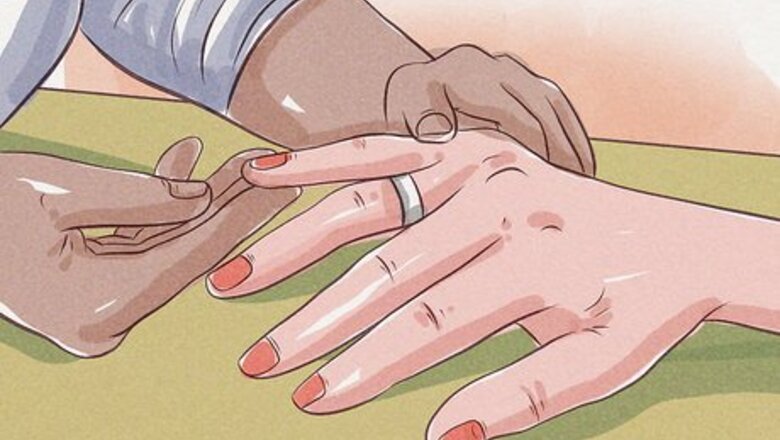
views
Getting a Ring Cut off by a Professional
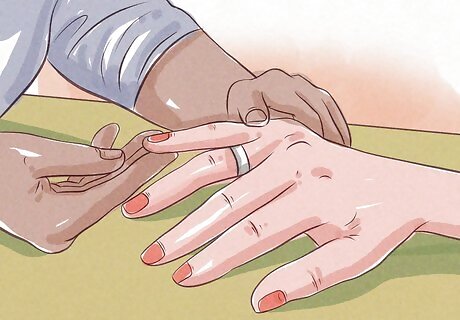
Go to a jeweler if you can’t get your ring off. If you’ve tried at-home methods and you just can’t get your ring to slide off, go to a jeweler. Most professional jewelers are experienced at removing stubborn rings. Depending on what the ring is made of, the jeweler may be able to repair and adjust the ring once it’s cut off. Many jewelers will remove a stuck ring free of charge or for a low fee. The cost of ring removal may depend on how difficult it is to cut through the ring.
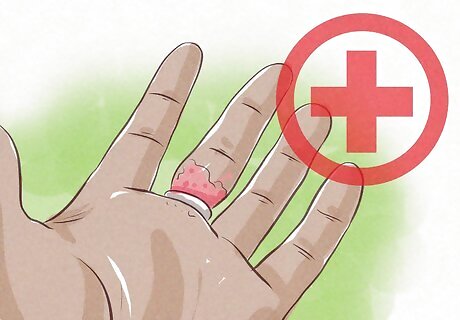
Get to the emergency room for severe swelling or pain. If the ring is cutting off blood flow to your finger and causing serious swelling, this can cause permanent damage to your hand. This is more likely to happen if you’ve had some kind of trauma or injury to your hand. In these situations, it’s crucial to get the ring removed by a medical professional as soon as possible. EXPERT TIP Kennon Young Kennon Young Master Gemologist Appraiser Kennon Young is a Master Gemologist Appraiser and the Owner of Vermont Gemological Laboratory in Burlington, Vermont. With over 20 years of experience in the industry, Kennon and his team specialize in handmade engagement rings, wedding bands, and custom jewelry. He attended the Revere Academy of Jewelry Arts, the Gemological Institute of America, and the Rhode Island School of Design Extension. He is a Jewelers of America (JA) Certified Bench Jeweler Technician and received the highest credential in the jewelry appraisal industry, the ASA Master Gemologist Appraiser, in 2016. Kennon Young Kennon Young Master Gemologist Appraiser Our Expert Agrees: There are a number of different ways to cut off a ring, but if you're in immediate danger, go to the emergency room.
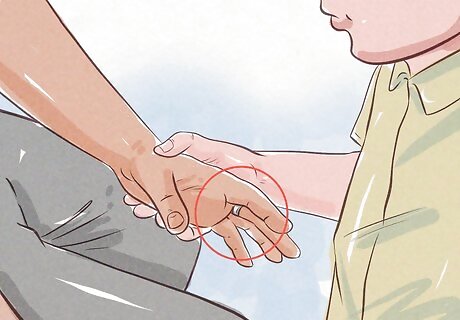
Tell the jeweler or ER staff what the ring is made of. Some rings are more difficult to cut than others. The best tool for the job will depend on your ring’s band width, thickness, and composition. If you know what your ring is made of, you can save the professional who will be cutting it off some time and trouble by telling them.
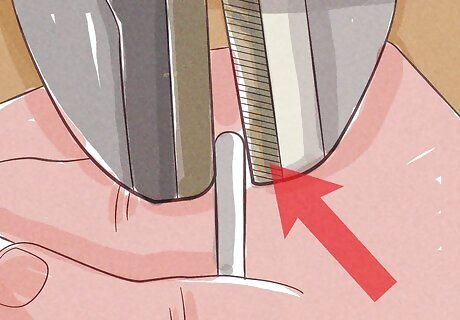
Have gold, silver, or platinum rings cut off with a steel cutter. These traditional ring metals are fairly soft and easy to cut. Typically, a silver, gold, or platinum ring can be repaired after being cut. The best tool for removing these rings is a high-speed steel ring cutter. A jeweler’s ring cutter is a small circular saw tool that resembles a can opener. A finger guard slides between the ring and your finger to protect your skin from the saw blade. Ring cutters can be either manual (hand-cranked) or electric. If you plan to save the ring and have it repaired, ask to have it cut in just one place. You may need 2 people to spread the ring apart with a pair of heavy-duty paperclips once the cut is made.
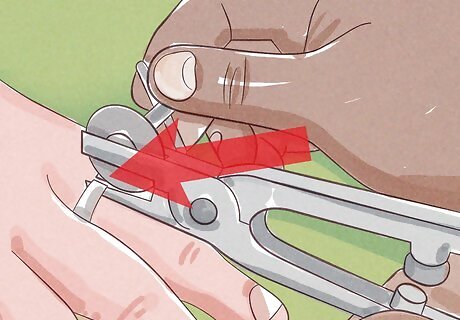
Get a titanium ring cut off with a diamond blade cutter. Titanium is much tougher than silver, gold, or platinum. Cutting it requires a harder blade. Diamond blade ring cutters are your best bet for removing most titanium rings. It may take 2-3 minutes to cut through a titanium ring with an electric diamond blade cutter. It is not always possible to cut a titanium ring with a manual ring cutter, especially if the ring is thick. The blade will need to be lubricated with water while cutting to prevent overheating. If no power cutter is available, bolt cutters may be used in an emergency. However, bolt cutters are more dangerous than ring cutters, and may not work on titanium rings that are more than 5-6 mm (about ¼ inch) wide.
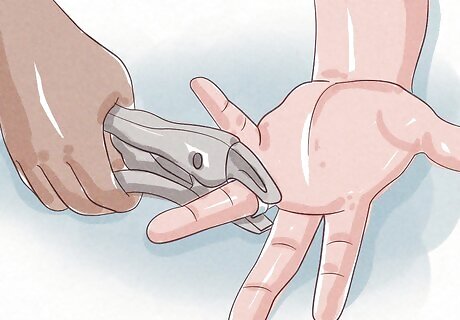
Have a tungsten, ceramic, or stone ring removed with a ring cracker. If your ring is made of one of these heavy-duty, hard-to-cut materials, the best option is to crush or crack the ring instead of cutting it. This can be done with a vice grip, locking pliers, or a specially designed ring cracker tool. A ring can be cracked by slipping the tool over the outside of the band and gradually tightening it in small increments. While this method sounds alarming, it is quick, safe, and painless when done properly. It typically takes about 30 seconds, and the ring will give before your finger experiences any pressure.
Cutting off a Ring with Household Tools
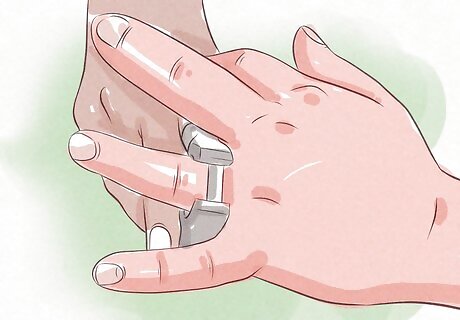
Cut off a ring at home as a last resort. If you don’t have access to immediate medical help and need to get a ring off right away, you can cut most rings off with common household tools. However, this must be done with extreme care to avoid the risk of further injury to the hand and finger. Never attempt to cut a ring off of your own finger. Have another person cut the ring off for you. Only try to cut a ring off at home if other methods have not worked and you cannot get professional help.
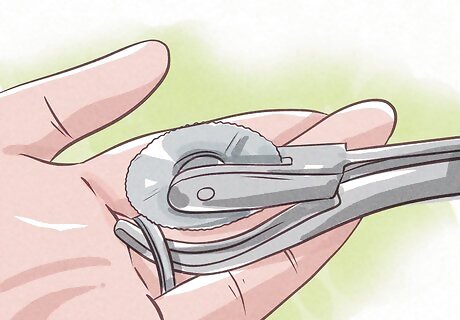
Use a rotary tool with a mini saw attachment for soft metal rings. A small steel circular saw blade can be used to remove rings made of gold, silver, or platinum. This may also work for titanium rings, but it may take several minutes to make the cut successfully. Diamond blades are more effective for harder materials, such as titanium or stainless steel. Insert something metal, like the blade of a butter knife or the handle of a spoon, between the ring and the finger in order to prevent the skin from being burned or cut. Hold the blade to the ring for a second or two at a time, and lubricate the ring with a few drops of cold water between cuts to prevent overheating. Cut through the ring in two places, e.g. on opposite sides of the finger, to make it easier to remove. Do not attempt to use a blade to cut off a tungsten carbide, stone, or ceramic ring.
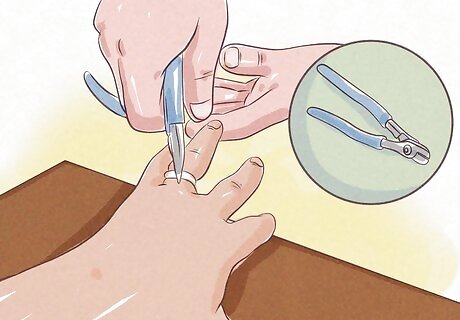
Cut off a tougher ring with bolt cutters. Some hard-to-cut rings, such as titanium or stainless steel rings, can be snipped off with stainless steel bolt cutters. You will need to make two cuts on opposite sides of the ring to remove it effectively. Use extreme caution when using bolt cutters to remove a ring, as you can easily cut the finger with either the bolt cutters or the crushed edge of the ring band. If you can, slip something between the ring and the finger, such as the blade of a butter knife or a thin piece of foam padding, to protect the skin from getting snipped or lacerated. Bolt cutters will not work on a titanium ring with a wide band (i.e., more than 5-6 mm, or about ¼ inch, in width).
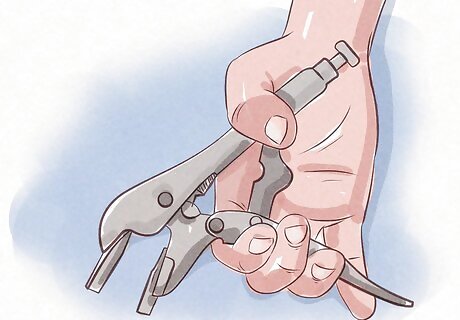
Crush a tungsten, ceramic, or stone ring with a vice grip. Tungsten, ceramic, and stone rings cannot be cut. However, they tend to be brittle and relatively easy to crack. Take a vice grip and adjust it until it fits over the ring, and then clamp it down on the outside of the ring. Release the vice, tighten the screw a tiny amount, and clamp it onto the ring again. Repeat this process until the ring cracks. Wear protective goggles if you have them, as small pieces of the ring may fly into your face when the ring cracks. Do not try to slide the cracked ring off, as this may cut the finger. Instead, pull the cracked pieces away.
Using Alternatives to Cutting
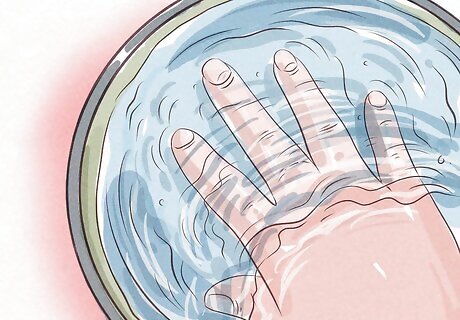
Reduce swelling with cold water. Sometimes exposure to cold temperatures can reduce swelling in your finger enough to allow a ring to slip off. Fill a bowl with cold water and soak your hand in it for a few minutes, then try to remove the ring. The water should be nice and cold, but not icy. If your tap water is not cold enough, put some water in your refrigerator to chill it.
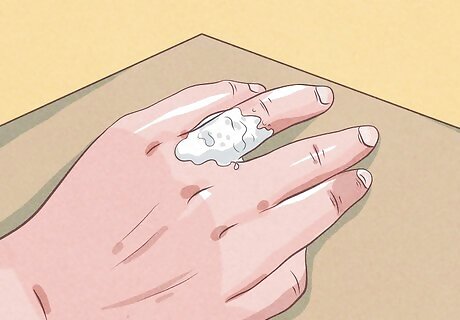
Lubricate your finger. In many cases, a tight ring will slip off with the help of a little lubricant. If your finger is not extremely swollen, try rubbing a gentle lubricant, such as hand lotion, petroleum jelly, soap, or baby oil on your finger around the ring. Once your finger is well lubricated, try to slide the ring off. If your skin is broken, use an antibiotic ointment or vitamin A and D ointment. The lubrication method may work best in combination with other methods. Try cooling your finger in cold water to reduce swelling before lubricating it. Helen Driggs Helen Driggs, Jewelry Designer When faced with a stuck ring, restraint is key. Avoid methods that could damage skin or the ring itself. Instead, lubricate the finger and gently twist and pull. If unsuccessful, string dental floss or soft wire underneath and roll down the finger. For tighter bands, have a professional jeweler use ring cutters designed not to shatter metal onto skin or eyes.
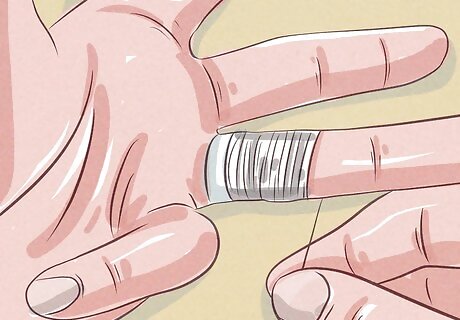
Try the string method if lubrication doesn’t work. This method works by compressing your finger, making it easier to slide the ring off. Start by taking a length of thread, string, or dental floss, and slipping one end of it under your ring. You may need to use a needle (carefully!) to pull the string between the ring and your finger.
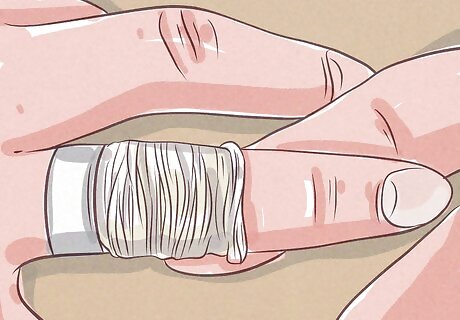
Wrap the string around your finger. Once the end of the string is in place under your ring band, start winding the string around your finger just above the top of the ring. Continue until your finger is wrapped to just past the knuckle.
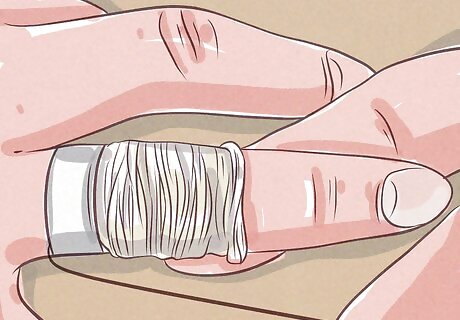
Pull the bottom end of the string to unwind it. Pull up on the end of the string that is sticking out from under your ring. This should cause the string to unwind and push the ring up over your knuckle. Relax your hand and allow your knuckle to bend slightly as you pull the string.



















Comments
0 comment